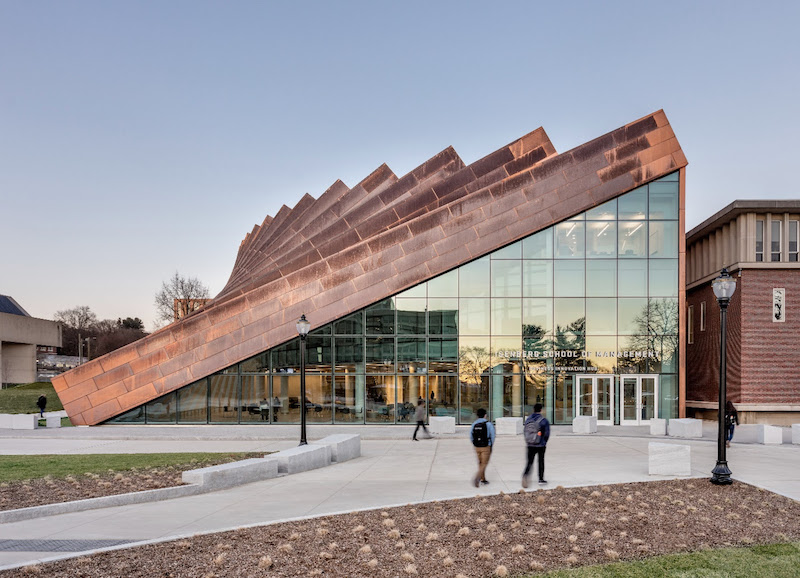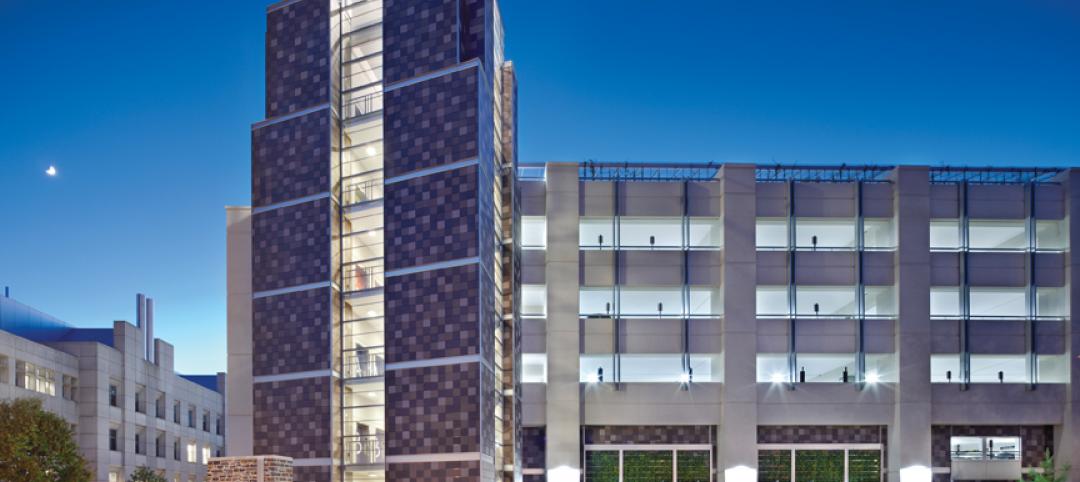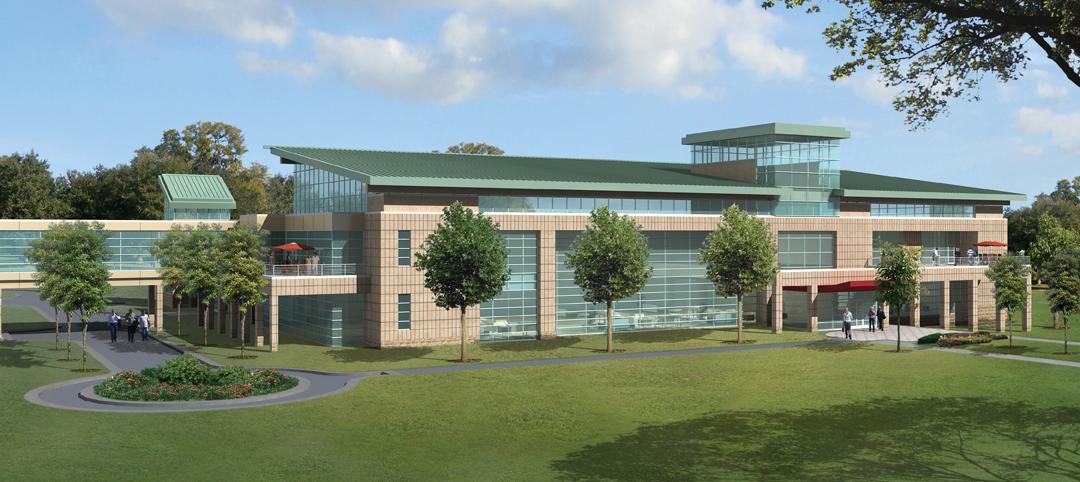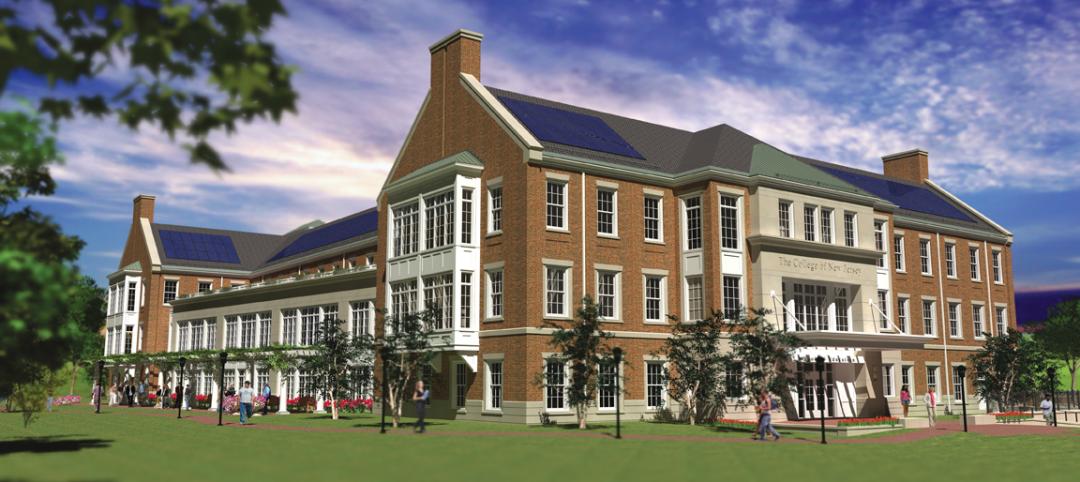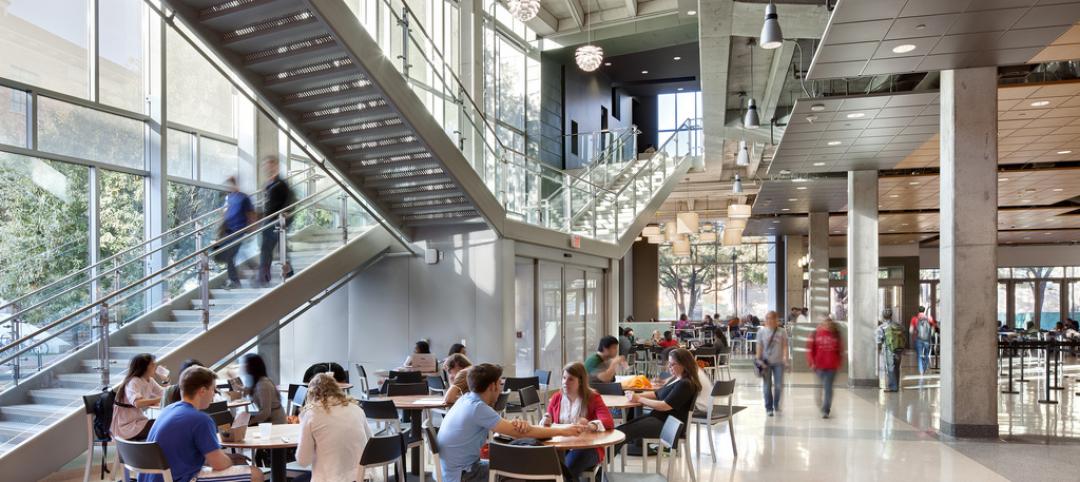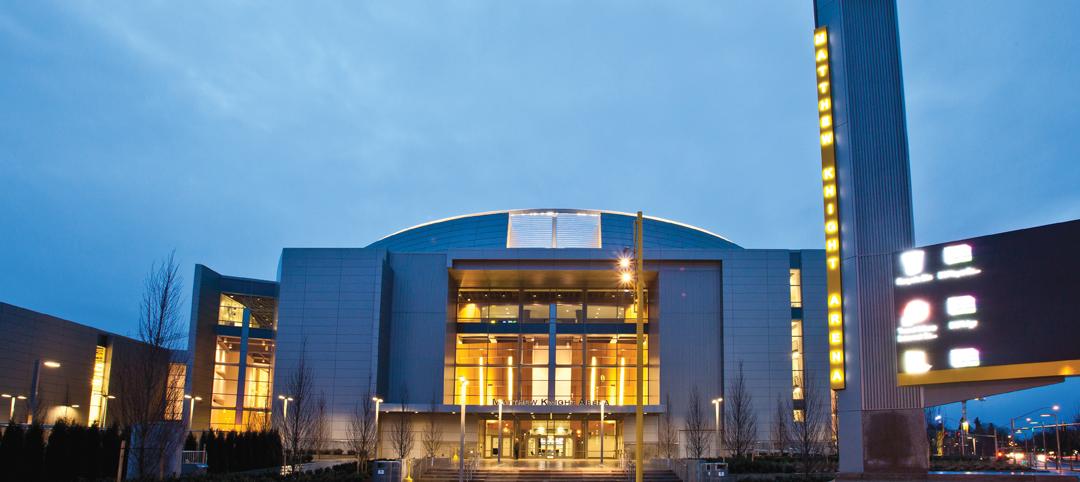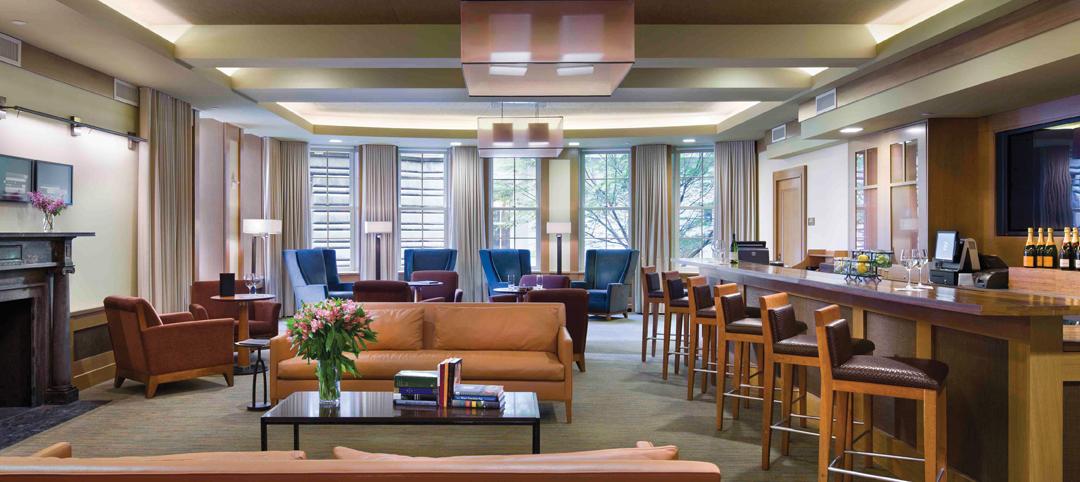Umass Amherst’s new 70,000-sf Business Innovation Hub combines a new expansion with the partial renovation of the Isenberg School of Management. Bjarke Ingels Group (BIG) designed the building with Goody Clancy as the architect of Record.
The building doubles the school’s current space and introduces new facilities for more than 150 staff and 5,000 students in undergraduate, master’s, and PhD programs. The exterior is wrapped in straight, vertical pillars that gradually slope downward, creating a domino effect and a triangular glass entrance. The exterior’s copper cladding will naturally weather from a dark ochre to a patina with long-term exposure to the elements.
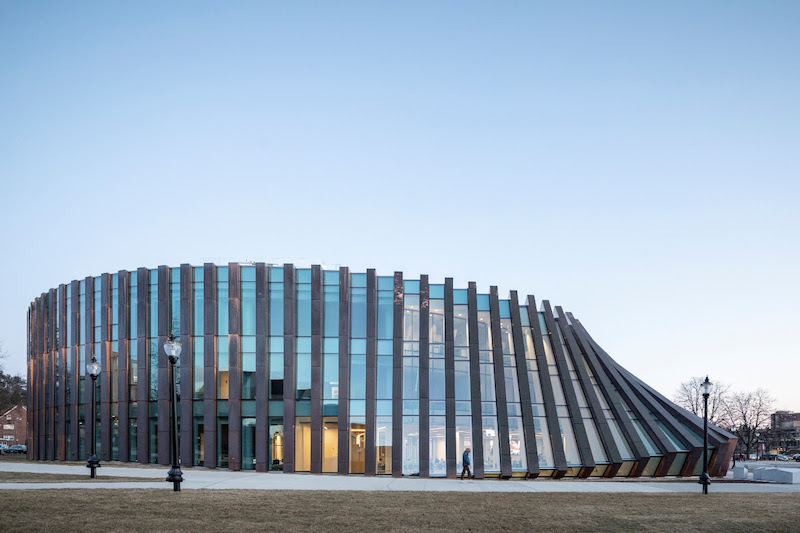 Photo: Laurian Ghinitoiu.
Photo: Laurian Ghinitoiu.
Students and faculty will enter into the naturally-lit, 5,000-sf Learning Commons. This will be a place for learning, networking, and dining. The Learning Commons can also double as a venue for guest speakers, ceremonies, banquets, and career fairs.
See Also: 17-story Data Sciences building to rise on Boston University campus
The Business Innovation Hub extends directly into the existing 1964 building from the north and east sides in a wide circular loop. The loop consolidates Isenberg’s faculty and staff under one roof and creates a circular place of arrival. Various conference rooms and breakout areas are distributed throughout the loop.
 Photo: Laurian Ghinitoiu.
Photo: Laurian Ghinitoiu.
“The new Business Innovation Hub at the Isenberg School of Management is conceived as an extension of both the building and the campus mall,” said Bjarke Ingels, Founder and Creative Director, BIG, in a release. “The linear structure is bent to form a full loop framing an internal courtyard for the life of the students. The façade is pulled away in a domino effect to create a generous invitation from the Haigis Mall to the Learning Commons. The mall and the courtyard – inside and outside form a forum for the students, the faculty and the profession to meet, mingle and mix society and academia.”
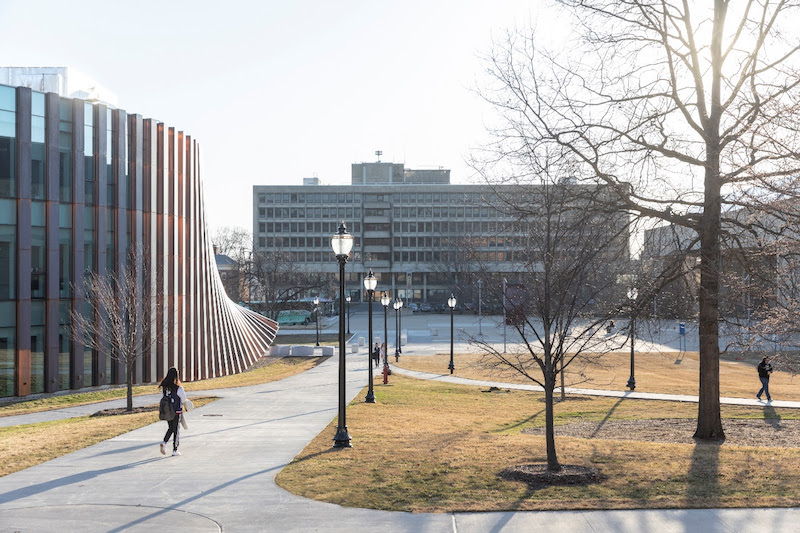 Photo: Laurian Ghinitoiu.
Photo: Laurian Ghinitoiu.
Innovation labs, advising spaces, and faculty offices are located on the second and third floors. Classrooms are equipped with integrated technology for distance learning and can be easily transformed for theater-style lectures or small group work.
The inner spaces of the extension face a circular courtyard that connects back to the campus via two pathways between the original Isenberg building and the Business Innovation Hub. Two bridges above these paths fuse the buildings.
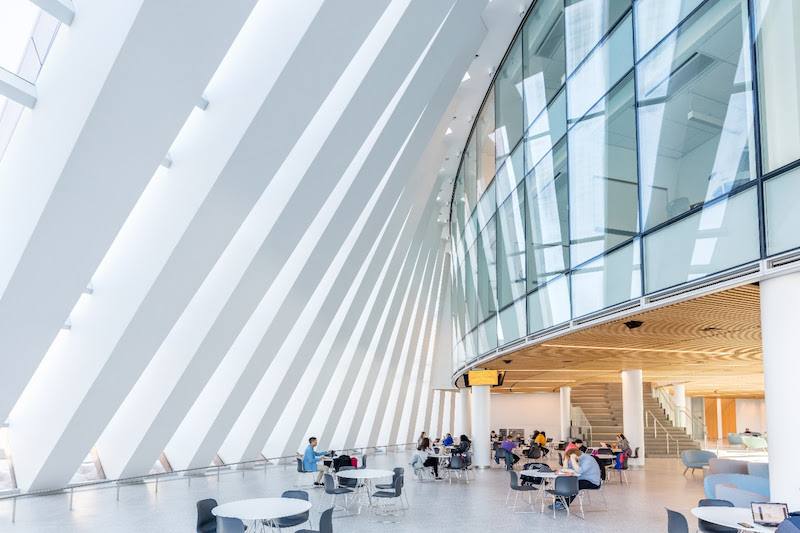 Photo: Max Touhey.
Photo: Max Touhey.
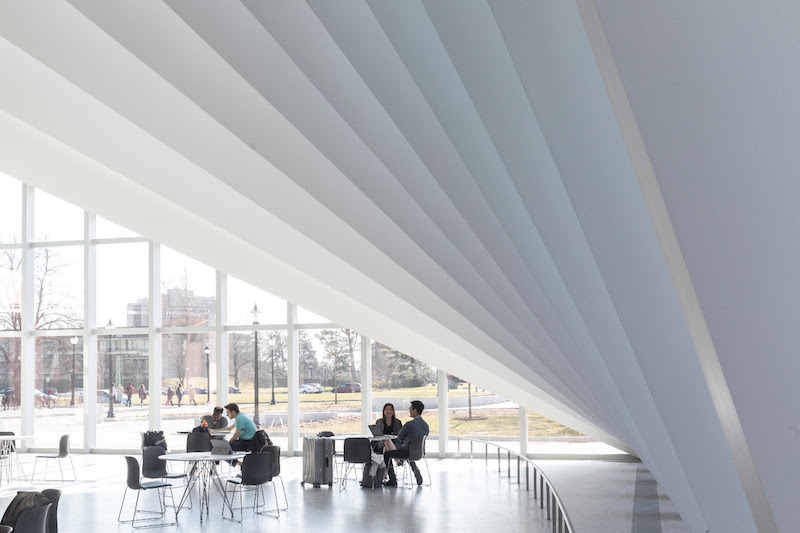 Photo: Laurian Ghinitoiu.
Photo: Laurian Ghinitoiu.
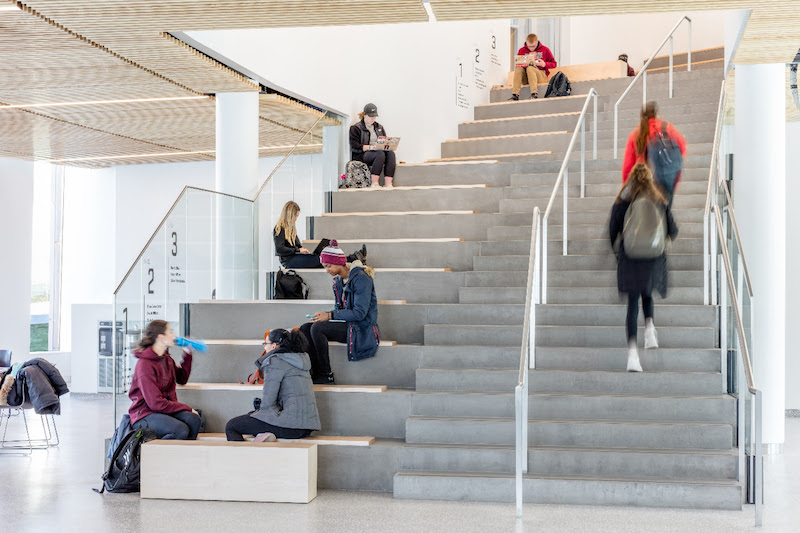 Photo: Max Touhey.
Photo: Max Touhey.
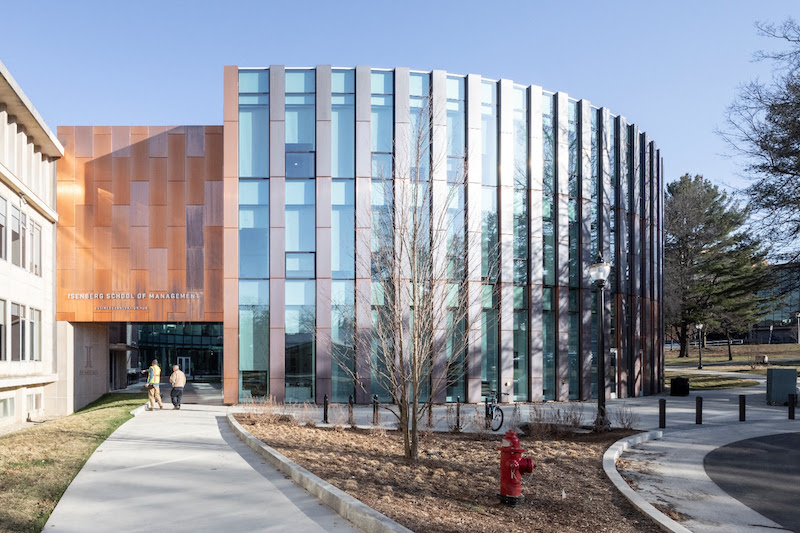 Photo: Laurian Ghinitoiu.
Photo: Laurian Ghinitoiu.
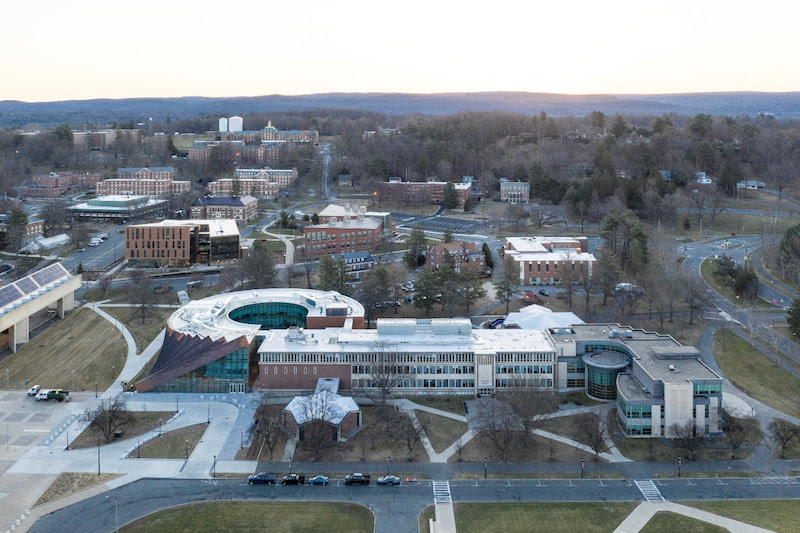 Photo: Laurian Ghinitoiu.
Photo: Laurian Ghinitoiu.
Related Stories
| Apr 13, 2011
Duke University parking garage driven to LEED certification
People parking their cars inside the new Research Drive garage at Duke University are making history—they’re utilizing the country’s first freestanding LEED-certified parking structure.
| Apr 12, 2011
Rutgers students offered choice of food and dining facilities
The Livingston Dining Commons at Rutgers University’s Livingston Campus in New Brunswick, N.J., was designed by Biber Partnership, Summit, N.J., to offer three different dining rooms that connect to a central servery.
| Apr 12, 2011
College of New Jersey facility will teach teachers how to teach
The College of New Jersey broke ground on its 79,000-sf School of Education building in Ewing, N.J.
| Mar 23, 2011
After 60 years of student lobbying, new activity center opens at University of Texas
The new Student Activity Center at the University of Texas campus, Austin, is the result of almost 60 years of students lobbying for another dedicated social and cultural center on campus. The 149,000-sf facility is designed to serve as the "campus living room," and should earn a LEED Gold certification, a first for the campus.
| Mar 18, 2011
Universities will compete to build a campus on New York City land
New York City announced that it had received 18 expressions of interest in establishing a research center from universities and corporations around the world. Struggling to compete with Silicon Valley, Boston, and other high-tech hubs, officials charged with developing the city’s economy have identified several city-owned sites that might serve as a home for the research center for applied science and engineering that they hope to establish.
| Mar 15, 2011
What Starbucks taught us about redesigning college campuses
Equating education with a cup of coffee might seem like a stretch, but your choice of college, much like your choice of coffee, says something about the ability of a brand to transform your day. When Perkins + Will was offered the chance to help re-think the learning spaces of Miami Dade College, we started by thinking about how our choice of morning coffee has changed over the years, and how we could apply those lessons to education.
| Mar 11, 2011
University of Oregon scores with new $227 million basketball arena
The University of Oregon’s Matthew Knight Arena opened January 13 with a men’s basketball game against USC where the Ducks beat the Trojans, 68-62. The $227 million arena, which replaces the school’s 84-year-old McArthur Court, has a seating bowl pitched at 36 degrees to replicate the close-to-the-action feel of the smaller arena it replaced, although this new one accommodates 12,364 fans.
| Mar 11, 2011
Historic McKim Mead White facility restored at Columbia University
Faculty House, a 1923 McKim Mead White building on Columbia University’s East Campus, could no longer support the school’s needs, so the historic 38,000-sf building was transformed into a modern faculty dining room, graduate student meeting center, and event space for visiting lecturers, large banquets, and alumni organizations.
| Mar 11, 2011
Texas A&M mixed-use community will focus on green living
HOK, Realty Appreciation, and Texas A&M University are working on the Urban Living Laboratory, a 1.2-million-sf mixed-use project owned by the university. The five-phase, live-work-play project will include offices, retail, multifamily apartments, and two hotels.


